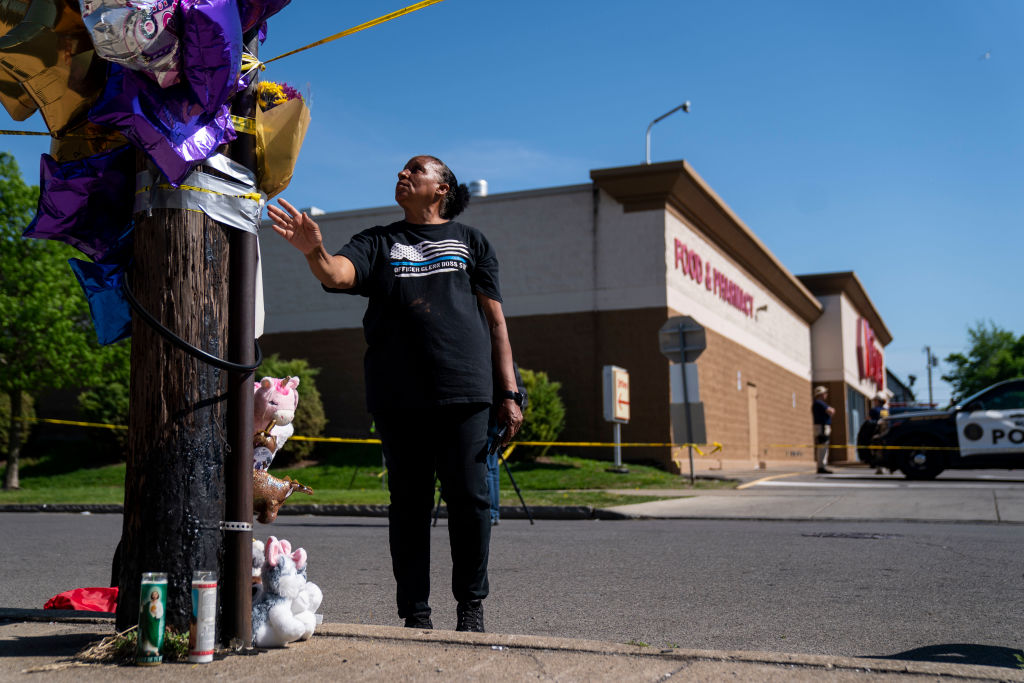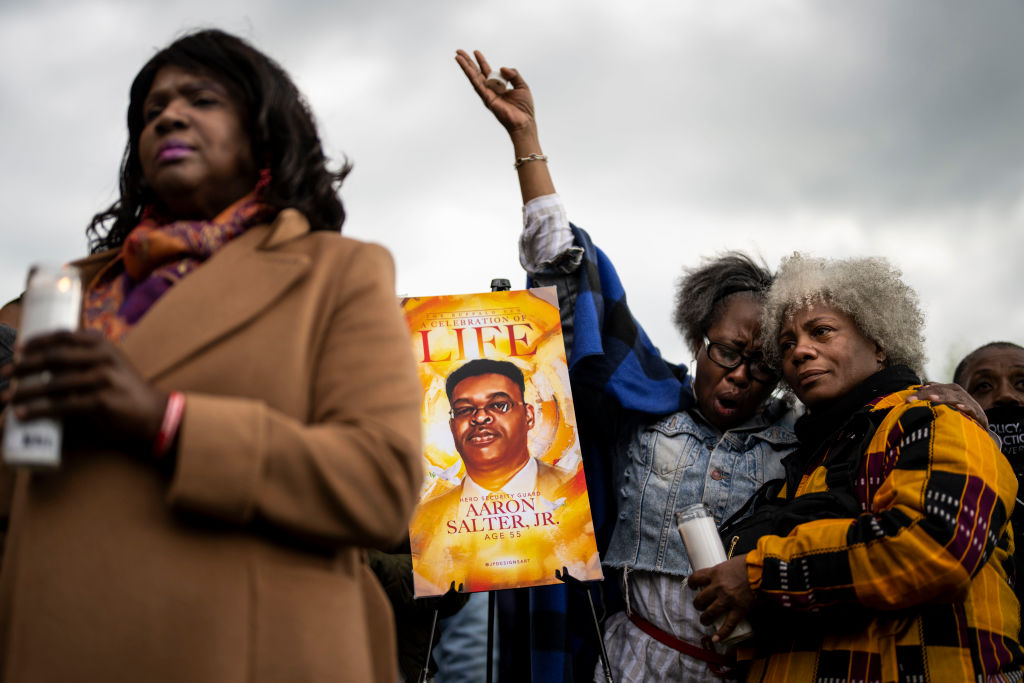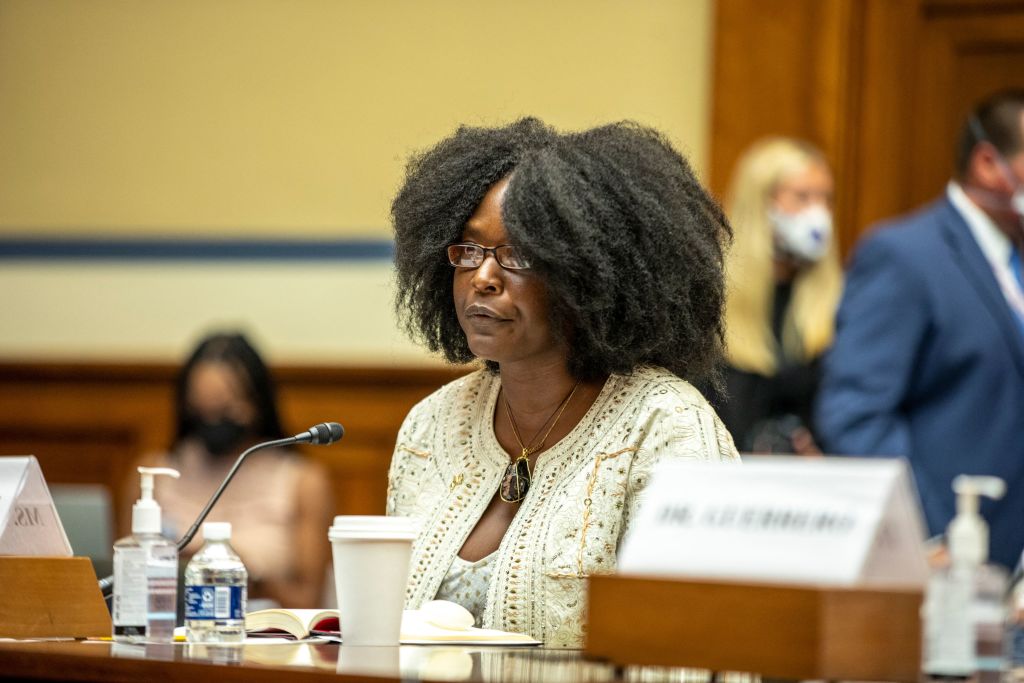This Mother’s Day, I’m Focusing On The Black Matriarchs In Buffalo
This Mother’s Day, I’m Focusing On The Black Matriarchs In Buffalo

Jeanne LeGall, of Buffalo, readjusts a couple of stuffed animals at a makeshift memorial near the Tops Friendly Market at Jefferson Avenue and Riley Street on Sunday, May 15, 2022, in Buffalo, New York. | Source: Kent Nishimura / Getty
Many will enjoy Mother’s Day with breakfast in bed, brunch at their favorite restaurants, the aroma of fresh flowers, and other displays of affection. While those things have their place, I will mark the day by holding space for the victims of the mass shooting in Buffalo, New York, which occurred one year ago on May 14, 2022. On that dreadful day, 10 innocent Black loved ones were massacred by a white supremacist as they took part in something as routine and regular as grocery shopping.
The irony that the one-year remembrance of the shooting falls on Mother’s Day is not lost on me. Black matriarchs are typically honored on Mother’s Day. But the May 14 shooting means that this Mother’s Day, we are mourning Black matriarchs. As an aside, the past several years have been particularly rough because many families lost Black matriarchs during the COVID-19 pandemic. The death of Black matriarchs has been so pronounced that I launched “Project Big Mama” and wrote a book of a similar title, “Big Mama Speakers,” to create spaces for Black families to mourn their matriarchs, not just on Mother’s Day, but every day.
The question becomes: ‘How do we heal?’ I come to this Mother’s Day understanding that healing work in our communities is essential. From generational trauma to natural disasters to the trauma that is typical in life, to COVID-19 and mass shootings, we are carrying a lot. It is important to focus on mothers of choice and mothers of birth. We want to create systems and structures that help Black mothers live, while advancing processes that help our entire community respond to and heal from trauma.
To be clear, I begin with the premise that trauma will touch us all. No one will leave this earth without experiencing a traumatic life event. Unfortunately, the current trauma impacting our communities is mass shootings. There is an immediate physiological response to loss associated with mass shootings, but there is also a longer-term impact of these horrific events. And we are all impacted: When one human being is murdered, all of humanity suffers a loss.
Unfortunately, our communities are hurting. And they are also seldom offered a respite. For instance, the servant leaders who responded in the aftermath of the massacre at TOPS have been working nonstop since the tragedy. From being present immediately after the targeted mass shooting to supporting families with funeral arrangements to helping the community put the pieces back together to being present at court proceedings, peace workers in Buffalo have not had time to recover. Yet they were traumatized in the most brutal way – local Urban League staff and other first responders ran into TOPS after the shooting and held victims who were bloodied, hurt and dying. This is unnatural and it is heart-wrenching.

A vigil across the street from Tops Friendly Market on May 17, 2022, in Buffalo, New York. | Source: Kent Nishimura / Getty
Rarely given sacred pause
We know that Black servant leaders are rarely afforded sacred pauses. However, all people need a respite from the storm. The nervous system cannot optimally function if it’s never given space to truly rest. When people keep moving and don’t rest, we see high blood pressure, depression, alcoholism, diabetes, inflammation. If the craving for a better life isn’t addressed, it manifests as over consumption in varied areas.
It is important that we offer this community and all communities a way to process and heal. Part of my work and that of my colleagues Dena Adler and Carol Penn, is to teach trauma-impacted people how to understand their nervous systems, validate their own experiences, offer context for the behaviors they engaged in since the traumatic life event; and make changes that allow them to heal emotionally, physically, and spiritually.
This Mother’s Day, I won’t have breakfast in bed because I’ll be on the ground in Buffalo. I will return to Buffalo, Friday to Sunday, along with my colleagues, to support those who support others. My team and I will continue teaching the people who serve the Buffalo community how to move trauma out of the body. This is essential because trauma creates a state of inflammation. Moving reduces inflammation, and so does writing and journaling. These things can also reduce depression. Our work also includes teaching trauma-impacted communities how to breathe; how to change and alter their breath to stimulate their nervous system in a way that facilitates healing and growth.
But most importantly, we want our communities to understand that no one is immune from trauma or guaranteed just one traumatic event. We must be prepared to navigate life as it comes. We want our communities to know what to do should they experience future trauma. This supports their sense of self and their long-term healing and recovery.

Zeneta Everhart, whose son Zaire Goodman, 20, was shot in the neck during the Buffalo Tops supermarket mass shooting and survived, testifies during a House Committee on Oversight and Reform hearing on gun violence on Capitol Hill in Washington, D.C, on June 8, 2022. | Source: JASON ANDREW / Getty
Although I live in Baltimore, I’ve had the privilege of being a long-time faculty member at the University of Buffalo, School of Continuing Education. When the shooting happened, I crowdsourced, collecting donations ranging from $3 to $300, so I could travel to Buffalo and help the healers heal. However, trauma doesn’t go away overnight, and my and my team’s work must continue. This means that we must be funded to help those who are poised to have the greatest impact.
I know not everyone is called to the front lines in the aftermath of a crisis. But you do not have to be on the front lines to make a difference. You can partner with me and my team by supporting our work in Buffalo. To do so, contact us at Embracing Buffalo at the Western New York Peace Center.
There is a connection between the physical and the emotional, and we want to help ensure it’s a healthy one – not just on Mother’s Day, but every day. This work is in service of all humanity, including Black matriarchs.
Sabrina N’Diaye, PhD, LSCW-C, is the founder of The Heart Nest Center for Peace and Healing. She is a senior faculty member and supervisor at The Center for Mind-Body Medicine, and a retreat facilitator/master teacher at The Farm of Peace. You can learn more about her here: www.drsabrinandiaye.com.
SEE ALSO:
Author Sanya Simmons Reflects On Motherhood Lessons And Joy Of Raising Two Black (Gentle) Men
Op-Ed: This Mother’s Day, Take A Stand Against Forced Motherhood
















